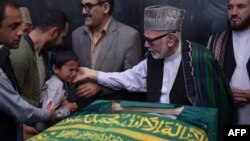Hundreds of people braved the heat to attend the funeral Tuesday in Kabul of Afghan freelance journalist Zabihullah Tamanna, who was killed in Afghanistan's restive Helmand province, where some of the fiercest fighting between Taliban insurgents and Afghan forces has taken place.
Tamanna's funeral coincided with the Muslim holy month of Ramadan, when Muslims are expected to spend the month fasting during daylight hours, eschewing even water, and spending more time in prayer and study of the Quran.
The 38-year-old father of three and his U.S. colleague, David Gilkey of National Public Radio, were traveling in a military convoy between the cities of Lashkar Gah and Marja Sunday when their vehicle was struck by a mine in an area where fighting was ongoing, according to an Afghan Defense Ministry spokesman, General Daulat Waziri.
Gilkey and two Afghan soldiers in the vehicle were also killed. Afghan forces had recently reopened the road after months of Taliban control. The surrounding agricultural region is considered a Taliban stronghold and the center of the country's opium poppy production.
Tamanna started his career in 2002 as a photojournalist for China’s Xinhua news agency and ran the agency’s Kabul bureau until 2010. He then became a freelance journalist, photographer, and often translator with multiple foreign news outlets including Indian, European, and U.S.-based organizations. For the past few years, he was working with Turkey's Anadolu news agency and NPR of the United States.
Tamanna is survived by his wife, two sons and a daughter.
Most dangerous place for journalists
Afghanistan ranks as one of the world's most dangerous places for journalists, according to the U.S.-based Committee to Protect Journalists. Twenty-nine journalists have been killed in Afghanistan since 1992, said the CPJ on its website.
Separately, Reporters Without Borders (RSF), in a press release condemning the incident in Afghanistan, pointed out that the two journalists died on the ninth anniversary of the murder of Zakia Zaki, the director of Sada-e-Solh (Voice of Peace Radio) in Jabal Saraj, in Afghanistan's northern province of Parwan.
According to the information obtained by RSF, her murderers were followers of Gulbuddin Hekmatyar, the founder and leader of the Islamist group Hezb-e-Islami, or HIA. Several sources said that, several months before Zaki’s murder, Hekmatyar issued a fatwa against her, saying, “If you want to protect Islam, you must silence this woman’s voice,” according to RSF. Zaki’s murder was never properly investigated, RSF said.
HIA has been the first Afghan Taliban group to show interest in joining reconciliation talks with the current Afghan government and signed a deal with officials last month.





